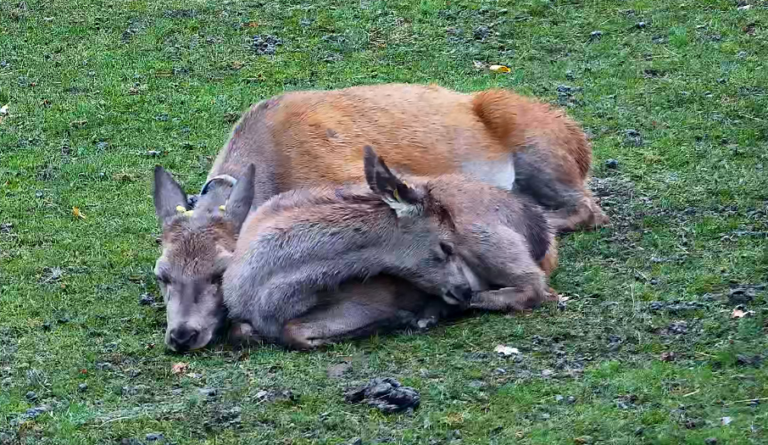Project Description
Nearly all animals, from jellyfish to vertebrates, sleep. Because sleep provides many key benefits for the brain and body, including boosting immune levels and response to infections, sleep loss is accompanied by numerous short- and long-term detrimental effects on health. Most likely to offset these costs, sleep loss is followed by longer sleep. However, sleep is potentially costly for wild animals since, compared to when awake, sleeping individuals are less aware of what happens around them and less quick to respond to changing conditions, such as approaching predators.
The ecological theory of the landscape of fear1 posits that prey adjust their behaviour (e.g. more vigilance, less foraging) and physiology (e.g. higher stress) not only when predators are present but also when using areas perceived to be risky. Likewise, fear of ‘super-predator’ humans alters behaviour across entire wildlife communities and increases stress levels. Given the increased vulnerability during sleep, individuals should alter sleep plastically when facing higher predation or hunting risk, a hypothesis so far untested in wild animals. This project investigates whether sleep is shorter, more fragmented and of lower quality under predation or hunting risk. The project combines three elements but there is flexibility in the overall contribution of each element to the PhD.
- Wild populations: the project benefits from an ongoing study on wild red deer at the Doupov and Kladskà Forests (Czech Republic). The Kladská population is predator-free while red deer constitute 30% of the wolf’s diet at Doupov. At both sites, ~80% of deer use winter enclosures for supplementary feeding; wolves can also enter the enclosure at Doupov and a third of their kills in the enclosure is accurately dated. Based on our classification of sleep in red deer from the biologger data collected since 2019, the student will compare sleep: (i) between the two populations; (ii) prior vs after dated predation events in the winter enclosure at Doupov; (iii) prior, during and after dated hunts for the 2-weeks long hunting season at both sites. The student will also map sleep, foraging and vigilance behaviour across the study sites to investigate spatially how investment in these behaviours is indicative of a landscape of fear. The student will help with deer capture and monitoring, particularly during winter and spring.
- Playback experiments: the student will carry out playback experiments of wolf vocalization to study the behavioural and physiological response to potential threats in red deer at the winter enclosure and/or in captive red deer. She/He will expose deer to predator and neutral cues to compare sleep and vigilance, quantified with biologgers, and stress levels (faecal cortisol) prior vs after exposure to cues.
- Theoretical modelling: the student will generalise the findings from the project by developing theoretical models on how sleep responds plastically to predation and hunting risks across time and space.
The project benefits from recently completed and ongoing projects of the supervisory team and collaborators on sleep in red deer, fallow deer and wild boar2,3 using cutting edge biologgers Daily Diaries.
CANDIDATE BACKGROUND
A 2.1 degree in zoology, ecology, biology or related discipline is essential; a Masters, MSci or equivalent in a relevant discipline is desirable.
The project requires a candidate with some experience with biologgers (accelerometers) and/or GPS data analysis and data collection, strong statistical/quantitative skills, and experience in research on wild or captive animals ideally in animal behaviour or movement ecology. The successful candidate must have great initiative, independence, adaptability, resilience, troubleshooting skills, and self-motivation.
Interested applicants are strongly encouraged to contact the Lead Supervisor Isabella Capellini to discuss the project and how they intend to develop it.
Photo credit: Isabella Capellini, Euan Mortlock, QUB
Supervisors
Isabella CapelliniPrimary Supervisor: | Profile: Isabella Capellini Email: I.Capellini@qub.ac.uk Institution: Queen's University, Belfast Department/School: School of Biological Sciences |
Greta BocediSecondary Supervisor: | Profile: Greta Bocedi Email: greta.bocedi@abdn.ac.uk Institution: University of Aberdeen Department/School: School of Biological Sciences |
Dómhnall JenningsAdditional Supervisor: | Profile: Dómhnall Jennings Email: d.jennings@qub.ac.uk Institution: Queen's University, Belfast Department/School: School of Biological Sciences |
Additional Supervisor: | Professor Luca Borger, University of Swansea Email: l.borger@swansea.ac.uk |
References
- Laundré et al. (2010). The landscape of fear: ecological implications of being afraid. The open ecology journal 3, 1-7.
- Mortlock et al. (in review). Sleep in the wild: the importance of individual effects and environmental conditions on sleep behaviour in wild boar. An earlier draft of this article can be found at https://www.biorxiv.org/content/10.1101/2022.11.23.517569v1
- Mortlock et al. (in review). Early life sleep in free living fallow deer (Dama dama): the role of ontogeny, environment and individual differences.
QUADRAT Themes
- biodiversity
Partners
To be confirmed






















































